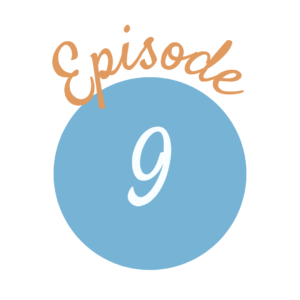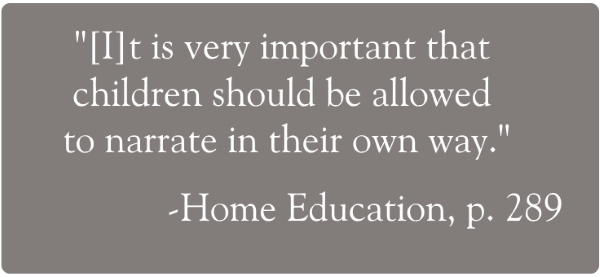
Whether in homeschooling, public or private schooling, the teacher finds that the appeal and wonder of narration that Charlotte Mason employed is not without its challenges. This episode addresses commonly asked questions and confusion surrounding the implementation of narration to offer some practical solutions to difficulties you may encounter in the classroom.
Listen Now:


“Even with regular lessons and short lessons, a further stimulus may be occasionally necessary to secure the attention of the child. His desire of approbation may ask the stimulus, not only of a word of praise, but of something in the shape of a reward to secure his utmost efforts. Now, rewards should be dealt out to the child upon principle: they should be the natural consequences of his good conduct.” (1/142)
“In considering the means of securing attention, it has been necessary to refer to discipline––the dealing out of rewards and punishments,––a subject which every tyro of a nursery maid or nursery governess feels herself very competent to handle. But this, too, has its scientific aspect: there is a law by which all rewards and punishments should be regulated: they should be natural, or, at any rate, the relative consequences of conduct; should imitate, as nearly as may be without injury to the child, the treatment which such and such conduct deserves and receives in after life.” (1/148)
“Let the boy read and he knows, that is, if he must tell again what he has read.” (6/261)
“…while we grown-up persons read and forget because we do not take the pains to know as we read, these young students have the powers of perfect recollection and just application because they have read with attention and concentration and have in every case reproduced what they have read in narration, or, the gist of some portion of it, in writing.” (6/185)
“Not only is narration not verbal memory, but reading and narration do not constitute the whole of the lesson. They are the kernel but not the whole fruit. There is the introduction and connection with the last lesson; there is the intelligent use of map, blackboard and pictures; there is the time after the narration for discussion. If a part of the lesson for any reason has to be omitted, this part may never be the narration, for narration is not, as so many people think, a test of the knowledge gained, but an integral part of the acquisition of knowledge, and the means whereby the ‘food of the mind’ (i.e. knowledge) is digested.” (PR36, pp. 780-782)
“Narration, however, if of many kinds, though always the answer to the question (put mentally): ‘What comes next?’ Obviously it requires some power of concentration from the first. Very young children, in the nursery class, are not expected to narrate, but often they insist on doing so because of this instinct to ‘tell all about it’ to somebody. How many of us can refrain from telling that good story we heard yesterday? And anything that must be remembered, do we not repeat it even if it is only ‘First turning to the left and third to the right’? Narration is extraordinarily satisfying to the narrator, though, alas, a little boring sometimes for the listener since he is getting it at secondhand.
“It must be, we know, the child’s answer to ‘What comes next?’ It can be acted, with good speaking parts and plenty of criticism from actors and onlookers; nothing may be added or left out. Map drawing can be an excellent narration, or, maybe, clay modelling will supply the means to answer that question, or paper and poster paints, or chalks, even a paper model with scissors and paste pot. Always, however, there should be talk as well, the answer expressed in words; that is, the picture painted, the clay model, etc., will be described and fully described, because, with few exceptions, only words are really satisfying.
“When children reach the middle school other types of narration may be used; they can offer headings to cover the lesson and then narrate by filling in the details under each heading or the class may be divided into small groups with a leader in each one and narrate part of or all the lesson…
“As to the interesting extras that the teacher can add, they may either come at the beginning, to arouse interest or curiosity or, generally better, at the end in those few minutes so jealously saved for questions, remarks, etc., which round off the perfect lesson.
“Narration in silence needs great concentration, but once mastered it gives the possessor the power of carrying on his education for the rest of his life.” (Wix, PR 68, pp. 61-63)

Writing to Learn, William Zinsser
(Contains affiliate links)


Thank you ADE ladies for a simple yet valuable refresh on the subject of narration. I had completely forgotten about the idea of silent narrations so after the podcast ended I attempted one based on what I had listened to. WOW! I am going to have to start this with my Form IIA student. Thank you for these podcasts and most of all your encouragement.
The timeliness of your 2.0 episode on narration is such a blessing from the Lord to me. We are just beginning to use the CM method, and I have so many questions as I go. Your podcast continues to help me answer them. Trying to narrate this episode gave me pause, as it was much harder than I thought it would be! Now I’m trying to narrate our morning devotional with my husband, and I realize that the process I am asking my kids to engage in is a radical shift for them, even if kids naturally like to “tell.” Thanks for your encouragements and helps.
I’m am loving all of your 2.0 episodes! I attempted a silent narration of a sermon I listened to following this episode and it was quite the task. I have a greater appreciation of my own child’s narrations and see how the act of narration is truly enough. Thank you for all your wisdom, help and encouragement. You all are a blessing to me!!
I was just telling a friend that I need to assign myself narrations over the books I am reading! I like to take notes of favorite quotes and such in my bullet journal, so I tried a written narration of the podcast, and it wasn’t too bad in my opinion. I will definitely be trying this in the future! My retention is much better this way. Thank you so much- I am new to CM and just found your podcast.
Thank you for all you do! I’m a newbie so forgive me if you said this somewhere and I missed it. I hear that oral narrations are not to be corrected most of the time. What about written narration? Thinking especially of spelling/punctuation errors. I am ok letting hard words slide but I want very badly to correct my fourth grader when he misspells America…
Katie,
Most errors in writing can be addressed directly in the grammar, transcription, or dictation lessons. In fact, I note problem words and select dictation passages for study that contain those words; this is the advantage of choosing your own dictation and not following a prepackaged curriculum. You are correct, however, that written narrations are not the same as a composition and should not be “handed back” with corrections. Most children take years to perfect writing skills, even mechanical ones like spelling, but for now getting the learning of what has been read down on paper is the major emphasis and should be where his efforts are focused.
Liz
I am so thankful for yet another well articulated podcast from you guys; especially on a subject that is such a big aspect of a Charlotte Mason education! I am a young mom with 3 kids 3 and under, so while I have not yet begun formal lessons, there is so much to glean and put into practice from Mason’s ideas as I am tirelessly habit training and working to create a beautiful atmosphere in our home! Sometimes everything I’m learning through her volumes and through this podcast can be like drinking water from a firehouse, so about a year ago I started a private “blog” (it’s actually just a google doc) for my parents and parent-in-laws to read that provides a place for me to narrate everything I’m learning. This helps me to practice this “act of knowing” as well as informs them on how their grandchildren are being taught and trained, as I feel just saying “homeschooling” does not scratch the surface of what this kind of education provides. Thankful to have a little push from this Narration 2.0 podcast to get back to that “blog” to really digest the rich ideas I’ve been feasting on lately.
Megan,
Thank you for taking time to share your experience in listening to the podcast and growing in your knowledge of CM. You are already ahead of the game by mastering the narration skill yourself before requiring it of your children.
Liz